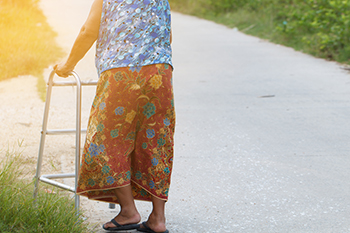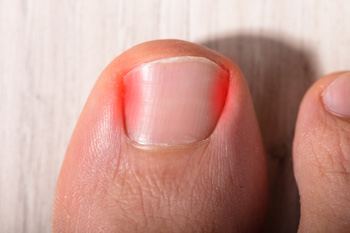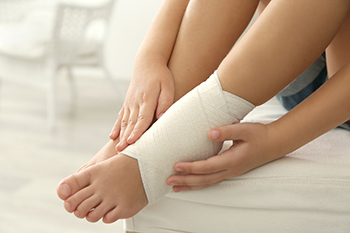October 2022
Can Falls Be Prevented?

Falling among the elderly can invoke a horrible fear to the extent that one may decide to limit their daily activities. This can negatively affect one’s quality of life and leave them socially isolated. Upon falling, many endure serious physical injuries that include the feet, making it difficult to walk. There are measures that can be implemented that may help to protect one from falling. These can include removing frayed rugs from the living environment, improving lighting in the household, and wearing shoes that fit correctly. Additionally, it is beneficial to install grab bars in the shower and toilet area, as well as use bath mats that can help to avoid slipping. Engaging in a gentle exercise program can help to strengthen the overall body and this is essential in falls prevention. If you have questions about additional methods that can prevent falling and the potential harm falling can have on the feet, please contact a podiatrist.
Preventing falls among the elderly is very important. If you are older and have fallen or fear that you are prone to falling, consult with Genine Befumo, DPM from University Foot and Ankle Center, L.L.C. Our doctor will assess your condition and provide you with quality advice and care.
Every 11 seconds, an elderly American is being treated in an emergency room for a fall related injury. Falls are the leading cause of head and hip injuries for those 65 and older. Due to decreases in strength, balance, senses, and lack of awareness, elderly persons are very susceptible to falling. Thankfully, there are a number of things older persons can do to prevent falls.
How to Prevent Falls
Some effective methods that older persons can do to prevent falls include:
- Enrolling in strength and balance exercise program to increase balance and strength
- Periodically having your sight and hearing checked
- Discuss any medications you have with a doctor to see if it increases the risk of falling
- Clearing the house of falling hazards and installing devices like grab bars and railings
- Utilizing a walker or cane
- Wearing shoes that provide good support and cushioning
- Talking to family members about falling and increasing awareness
Falling can be a traumatic and embarrassing experience for elderly persons; this can make them less willing to leave the house, and less willing to talk to someone about their fears of falling. Doing such things, however, will increase the likelihood of tripping or losing one’s balance. Knowing the causes of falling and how to prevent them is the best way to mitigate the risk of serious injury.
If you have any questions, please feel free to contact our office located in Monroe Township, NJ . We offer the newest diagnostic and treatment technologies for all your foot care needs.
Wounds That Don't Heal Need to Be Checked
All About Surgery for Ingrown Toenails

Ingrown toenails can be an annoying and potentially painful affliction of the foot. This condition occurs when the side of a toenail essentially grows into the skin of the toe. In severe cases, a surgical procedure may be needed to resolve the issue. For example, a surgical procedure might involve removing a part or all of the nail. Sometimes, before a surgical procedure of this kind, you might need to receive local anesthesia to numb the affected toe. Additionally, the procedure may take about an hour in time. Following the operation, your toe might need to be protected with some sort of bandage. The medical professional performing the procedure might then give you instructions on caring for your toe following the operation. If you have a persistent or infected ingrown toenail, contact a podiatrist today for help.
Ingrown toenails can become painful if they are not treated properly. For more information about ingrown toenails, contact Genine Befumo, DPM of University Foot and Ankle Center, L.L.C. Our doctor can provide the care you need to keep you pain-free and on your feet.
Ingrown Toenails
Ingrown toenails occur when a toenail grows sideways into the bed of the nail, causing pain, swelling, and possibly infection.
Causes
- Bacterial infections
- Improper nail cutting such as cutting it too short or not straight across
- Trauma to the toe, such as stubbing, which causes the nail to grow back irregularly
- Ill-fitting shoes that bunch the toes too close together
- Genetic predisposition
Prevention
Because ingrown toenails are not something found outside of shoe-wearing cultures, going barefoot as often as possible will decrease the likeliness of developing ingrown toenails. Wearing proper fitting shoes and using proper cutting techniques will also help decrease your risk of developing ingrown toenails.
Treatment
Ingrown toenails are a very treatable foot condition. In minor cases, soaking the affected area in salt or antibacterial soaps will not only help with the ingrown nail itself, but also help prevent any infections from occurring. In more severe cases, surgery is an option. In either case, speaking to your podiatrist about this condition will help you get a better understanding of specific treatment options that are right for you.
If you have any questions please feel free to contact our office located in Monroe Township, NJ . We offer the newest diagnostic and treatment technologies for all your foot and ankle needs.
Foot and Ankle Injuries in Martial Arts
 Different martial arts can lead to different injuries. Martial arts seem safe for young athletes, especially at beginner and intermediate levels. The risk of injury with these sports is lower than other sports but can still happen. Strains, sprains, and bruising can occur when practicing martial arts. Strains can occur in both muscles and tendons from sudden and extreme force. Foot injuries usually result from kicks, jumps, or sparring. The toes can be jammed, leading to bruising, dislocation, or fractures. Ankle injuries are less common, however, some martial arts movements such as the stand and kick or step and punch may place the ankle at risk. Ankle sprains can happen while participating in these sports and often involve inversion injury to the lateral ankle ligaments as the participant bears weight on the outer edge of the foot. These same ligaments can be hurt by striking the heel so hard that the foot is pushed into plantarflexion. This can happen from heel kicking the floor as one lands to break a fall or by landing on the opponent’s foot. If you participate or plan to participate in martial arts, it would be helpful to see a podiatrist to learn how to prevent or treat foot injuries common to these sports.
Different martial arts can lead to different injuries. Martial arts seem safe for young athletes, especially at beginner and intermediate levels. The risk of injury with these sports is lower than other sports but can still happen. Strains, sprains, and bruising can occur when practicing martial arts. Strains can occur in both muscles and tendons from sudden and extreme force. Foot injuries usually result from kicks, jumps, or sparring. The toes can be jammed, leading to bruising, dislocation, or fractures. Ankle injuries are less common, however, some martial arts movements such as the stand and kick or step and punch may place the ankle at risk. Ankle sprains can happen while participating in these sports and often involve inversion injury to the lateral ankle ligaments as the participant bears weight on the outer edge of the foot. These same ligaments can be hurt by striking the heel so hard that the foot is pushed into plantarflexion. This can happen from heel kicking the floor as one lands to break a fall or by landing on the opponent’s foot. If you participate or plan to participate in martial arts, it would be helpful to see a podiatrist to learn how to prevent or treat foot injuries common to these sports.
Sports related foot and ankle injuries require proper treatment before players can go back to their regular routines. For more information, contact Genine Befumo, DPM of University Foot and Ankle Center, L.L.C. Our doctor can provide the care you need to keep you pain-free and on your feet.
Sports Related Foot and Ankle Injuries
Foot and ankle injuries are a common occurrence when it comes to athletes of any sport. While many athletes dismiss the initial aches and pains, the truth is that ignoring potential foot and ankle injuries can lead to serious problems. As athletes continue to place pressure and strain the area further, a mild injury can turn into something as serious as a rupture and may lead to a permanent disability. There are many factors that contribute to sports related foot and ankle injuries, which include failure to warm up properly, not providing support or wearing bad footwear. Common injuries and conditions athletes face, including:
- Plantar Fasciitis
- Plantar Fasciosis
- Achilles Tendinitis
- Achilles Tendon Rupture
- Ankle Sprains
Sports related injuries are commonly treated using the RICE method. This includes rest, applying ice to the injured area, compression and elevating the ankle. More serious sprains and injuries may require surgery, which could include arthroscopic and reconstructive surgery. Rehabilitation and therapy may also be required in order to get any recovering athlete to become fully functional again. Any unusual aches and pains an athlete sustains must be evaluated by a licensed, reputable medical professional.
If you have any questions please feel free to contact our office located in Monroe Township, NJ . We offer the newest diagnostic and treatment technologies for all your foot and ankle needs.
Foot Care Is Essential for Diabetic Patients

Practicing good foot care is essential for most people, and it is especially imperative for diabetic patients. Neuropathy can affect people who are diabetic. This is a condition that causes the inability to feel existing cuts, bruises, and scrapes on the feet. If these cuts do not get immediate medical attention, infection may occur, which may lead to gangrene, and possible amputation. Foot care can begin with washing and drying the feet thoroughly, followed by applying a gentle moisturizer. It is beneficial to have the toenails trimmed weekly, in addition to refraining from walking barefoot. Many diabetic patients appreciate the benefits of engaging in a gentle exercise regime, which may help to improve circulation. The importance of wearing shoes that are comfortable and fit correctly cannot be impressed upon enough to restore and maintain proper foot health. If you have diabetes, it is strongly advised that you are under the care of a podiatrist who can treat and help you to manage this condition.
Diabetic foot care is important in preventing foot ailments such as ulcers. If you are suffering from diabetes or have any other concerns about your feet, contact Genine Befumo, DPM from University Foot and Ankle Center, L.L.C. Our doctor can provide the care you need to keep you pain-free and on your feet.
Diabetic Foot Care
Diabetes affects millions of people every year. The condition can damage blood vessels in many parts of the body, especially the feet. Because of this, taking care of your feet is essential if you have diabetes, and having a podiatrist help monitor your foot health is highly recommended.
The Importance of Caring for Your Feet
- Routinely inspect your feet for bruises or sores.
- Wear socks that fit your feet comfortably.
- Wear comfortable shoes that provide adequate support.
Patients with diabetes should have their doctor monitor their blood levels, as blood sugar levels play such a huge role in diabetic care. Monitoring these levels on a regular basis is highly advised.
It is always best to inform your healthcare professional of any concerns you may have regarding your feet, especially for diabetic patients. Early treatment and routine foot examinations are keys to maintaining proper health, especially because severe complications can arise if proper treatment is not applied.
If you have any questions please feel free to contact our office located in Monroe Township, NJ . We offer the newest diagnostic and treatment technologies for all your foot and ankle needs.
Blog Archives
- April 2024
- March 2024
- February 2024
- January 2024
- December 2023
- November 2023
- October 2023
- September 2023
- August 2023
- July 2023
- June 2023
- May 2023
- April 2023
- March 2023
- February 2023
- January 2023
- December 2022
- November 2022
- October 2022
- September 2022
- August 2022
- July 2022
- June 2022
- May 2022
- April 2022
- March 2022
- February 2022
- January 2022
- December 2021
- November 2021
- October 2021
- September 2021
- August 2021
- July 2021
- June 2021
- May 2021
- April 2021
- March 2021
- February 2021
- January 2021
- December 2020
- November 2020
- October 2020
- September 2020
- August 2020
- July 2020
- June 2020
- May 2020
- April 2020
- March 2020
- February 2020
- January 2020
- December 2019
- November 2019
- October 2019
- September 2019
- August 2019
- July 2019
- June 2019
- May 2019
- April 2019
- March 2019
- February 2019
- January 2019
- December 2018
- November 2018
- October 2018
- September 2018
- August 2018
- July 2018
- June 2018
- May 2018
- April 2018
- March 2018
- February 2018
- January 2018
- December 2017
- November 2017
- October 2017
- September 2017
- August 2017
- July 2017
- June 2017
- May 2017
- April 2017
- March 2017
- February 2017
- January 2017
- December 2016
- November 2016
- October 2016
- September 2016
- August 2016
- July 2016
- June 2016
- May 2016
- April 2016
- March 2016
- February 2016
- January 2016
- December 2015
- November 2015
- October 2015
- September 2015
- August 2015
- July 2015
- June 2015
- May 2015
- April 2015
- March 2015
- February 2015
- January 2015
- December 2014
- November 2014
- October 2014
- September 2014
- August 2014
- July 2014





